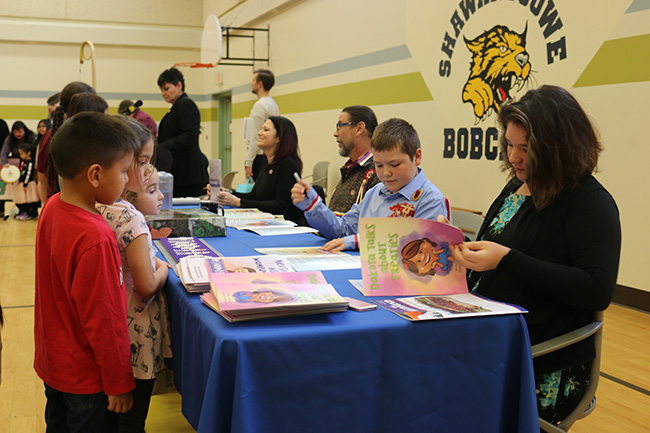Anishinabek Nation helps kick off Treaties Recognition Week

By Marci Becking
WHITEFISH RIVER FN – Some 50 staff and students of Shawanosowe School in Whitefish River First Nation helped to kick off the second annual Treaties Recognition Week in Ontario by hosting the launch of two new Treaty education elementary books.
The books “Alex shares his Wampum Belt” and “Dakota Talks about Treaties” were written by educator Kelly Crawford from M’Chigeeng First Nation and illustrated by Donald Chretien from Nipissing First Nation.
The subjects of the books are Alex Hebert, 11 from Dokis First Nation who lives in Sturgeon Falls and Dakota Bellissimo, 12, from Nipissing First Nation who lives in Lively.
Crawford says she told Alex and Dakota’s stories.
“Alex’s story is his experience in creating the LEGO version of the Treaty of Niagara wampum belt,” says Crawford. “The book also explains where wampum beads come from and what an agreement means.”
“Dakota’s story is her experience of being one of three children who attended the 250th anniversary of the Treaty of Niagara in Niagara Falls in July of 2014,” explains Crawford. “Students will learn that wampum belts are sacred and the meaning of a treaty.”
Both books were designed to be “read-aloud” books so that a conversation can be started in the classroom.
The books are also complementary to the “We are all Treaty People” teachers kit which includes baseplates and 800 LEGO bricks to build the replica belt.
Grand Council Chief Patrick Madahbee says that treaty education is important for all children to learn because they will learn about the real history of Canada and how this country was created.
“These books talk about the relationship,” says Madahbee. “Teachers will be getting out the message that treaties are legally-binding and sacred agreements that set out the rights, responsibilities and relationships of First Nations and federal and provincial governments.”
Madahbee says that there are 46 treaties that cover Ontario and it’s important for the various areas to learn about the treaty they live in.
“The relationship with the Crown is alive and relevant to today.”
Crawford says that as the band-aid gets ripped off, it’s going to hurt.
“It is very hard to realize that the history you believe, and the land that you live on and you are connected to, that the stories that you were told are not the truth.”
Mitizie Hunter, Minister of Education in Ontario says that these books will be wonderful additions to classrooms across the province.
“Books like these help to enrich all students’ understanding of the histories, culture, contributions and perspectives of Indigenous peoples in Canada.”
Whitefish River Chief Shining Turtle says that we need to reset the relationship with all Canadians about the importance of treaties and the original relationships.
The Robinson Huron Treaty Annuities lawsuit before the courts is helping bring awareness to this week.
Indigenous Relations and Reconciliation and Minister David Zimmer, who attended the launch, says that not many people in Ontario know about treaties.
“We intend to change that,” says Zimmer. “We also have to recognize the relationship during the War of 1812. If not for the Indigenous people from all over, we would be flying and American flag right now.”
The Ministry of Education is changing the curriculum in Ontario to include treaty education and information on Indian Residential Schools.
The treaty resources created by the Anishinabek Nation since 2011 are already being used in over 2500 schools across Ontario.
Alex Hebert says that he will be helping his school (White Woods) learn about treaties.
“I understand that my teachers are learning about some of this information for the first time. It’s not their fault though,” says Hebert. “I think that the more comfortable teachers get with teaching the kits and the books, the easier it will be.”
The book launch was part of Ontario’s Living Library Program. Indigenous speakers shared their knowledge and perspectives on treaties in more than 60 communities across the province. Those who hear these perspectives will walk away with a better understanding of the whole history of Canada, and the importance of honouring treaty obligations.
Promoting greater awareness of treaties is one of many steps on Ontario’s journey of healing and reconciliation with Indigenous peoples.
The books are also available in French and can be ordered through the Anishinabek Nation head office by emailing orders@anishinabek.ca. or by calling 705-497-9127.


